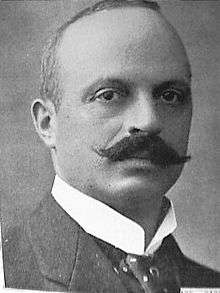Charles Ruijs de Beerenbrouck
| Jonkheer Charles Ruijs de Beerenbrouck | |
|---|---|
 | |
| 28th and 31st Prime Minister of the Netherlands | |
|
In office 10 August 1929 – 26 May 1933 | |
| Monarch | Wilhelmina |
| Preceded by | Dirk Jan de Geer |
| Succeeded by | Hendrikus Colijn |
|
In office 9 September 1918 – 4 August 1925 | |
| Monarch | Wilhelmina |
| Preceded by | Pieter Cort van der Linden |
| Succeeded by | Hendrikus Colijn |
| Personal details | |
| Born |
Charles Joseph Maria Ruijs de Beerenbrouck 1 December 1873 Roermond, Netherlands |
| Died |
17 April 1936 (aged 62) Utrecht, Netherlands |
| Political party | RKSP |
| Spouse(s) | Maria van der Heyden |
| Children | 3 |
| Alma mater | Utrecht University |
| Occupation | Lawyer |
| Religion | Roman Catholic |
| Signature |
 |
Jhr. Charles Joseph Maria Ruijs de Beerenbrouck (1 December 1873 – 17 April 1936) was a Dutch nobleman and Prime Minister of the Netherlands from 1918 to 1925 and again from 1929 to 1933. He was a member of the Roman Catholic RKSP.
Early life
Charles Joseph Maria Ruijs de Beerenbrouck was born on 1 December 1873 in Roermond, a town with a Bishop's see in the province of Limburg, in the very south of the Netherlands. Born into an aristocratic family, he grew up in a predominantly Roman Catholic community and went to school in Maastricht and in The Hague. He attended the Utrecht University and in 1895 Ruijs de Beerenbrouck obtained his master's degree in law at the Leiden University.
He was the son of Gustave Louis Marie Hubert Ruijs de Beerenbrouck (1842–1926), Minister of Justice in the government-Mackay (founder of the labor and social laws first) and later governor of Limburg (1918).
Career
He started his career in 1896 as a lawyer in Maastricht. In 1899 Ruijs de Beerenbrouck became a member of the Maastricht City council and in 1905 he was elected to the House of Representatives. Ruijs de Beerenbrouck remained a city councillor and a member of parliament until 16 May 1918, when he became Queen's Commissioner of the province of Limburg (in the province of Limburg usually called "Gouverneur" (governor)).
Ruijs de Beerenbrouck did not stay in office as Queen's Commissioner for long, as on 9 September 1918 he was appointed as Prime Minister of the Netherlands.
As Prime Minister he had to deal with the aftermath of World War I. Although The Netherlands remained neutral during the conflict, Ruijs de Beerenbrouck nevertheless was facing several problems, especially the return of German troops through the province of Limburg and the exile of the German emperor Wilhelm II.
In November 1918 the leader of the Sociaal Democratische Arbeiders Partij (SDAP) (Social-Democratic Labour Party), Pieter Jelles Troelstra, inspired by the Russian Revolution of 1917 and the German Revolution of 1918–1919 called for a socialist revolution among the working class. Fortunately for Ruijs de Beerenbrouck, the revolution attempt of Troelstra met with little enthusiasm. However, in order to satisfy the working class, he enacted several social reforms.
From 1925 to 1929 Ruijs de Beerenbrouck was President of the House of Representatives.
During his third cabinet Ruijs de Beerenbrouck had to deal with the worldwide Great Depression of 1929 and the early 1930s, which had crippling effects on the Dutch economy, effects which lasted longer than they did in most European countries. The depression lead to large unemployment and poverty, as well as increasing social unrest. Ruijs de Beerenbrouck was forced to cut down government expenses and to devaluate the national currency, the Guilder, but these measures only worsened the effects of the economic crisis.
In February 1933 the third cabinet Ruijs de Beerenbrouck ordered the bombing of the navy cruiser "De Zeven Provinciën", when sailors aboard the cruiser, cruising near Sumatra, mutinied because of the cutting of their wages. Twenty three mutineers were killed, resulting in a prolonged controversy and recriminations (see Mutiny on "De Zeven Provinciën").
In 1933 Ruijs de Beerenbrouck again became President of the House of Representatives. He remained in office until his death.
Ruijs de Beerenbrouck died on 17 April 1936 in Utrecht.
References
- Parlement en Politiek parlement.com biography Ruijs de Beerenbrouck
| Political offices | ||
|---|---|---|
| Preceded by Alexander Willem Frederik Idenburg |
Minister of Colonial Affairs (interim) 1918-1919 |
Succeeded by Simon de Graaff |
| Preceded by Pieter Cort van der Linden |
Prime Minister of the Netherlands 1918-1925 |
Succeeded by Hendrikus Colijn |
| Preceded by Dionysius Adrianus Petrus Norbertus Koolen |
President of the House of Representatives 1925-1929 |
Succeeded by Josef van Schaik |
| Preceded by Dirk Jan de Geer |
Prime Minister of the Netherlands 1929-1933 |
Succeeded by Hendrikus Colijn |
| Preceded by Josef van Schaik |
President of the House of Representatives 1933-1936 |
Succeeded by Piet Aalberse |

